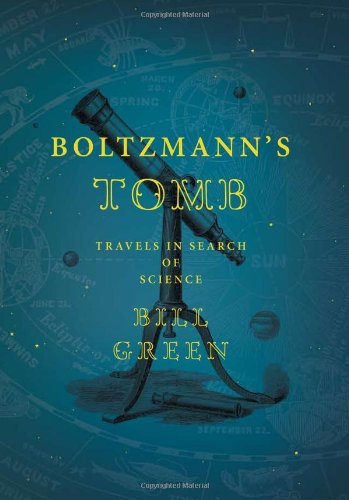
Boltzmann's Tomb
Travels in Search of Science
فرمت کتاب
ebook
تاریخ انتشار
2011
نویسنده
Улоф Лагеркранцنویسنده
Олег Юрьевич Захаровنویسنده
Улоф Лагеркранцنویسنده
Олег Юрьевич Захаровنویسنده
Bill Greenشابک
9781934137529
کتاب های مرتبط
- اطلاعات
- نقد و بررسی
- دیدگاه کاربران
نقد و بررسی

April 25, 2011
Readers who prefer skimming a topic to immersion should enjoy Green's (Water, Ice & Stone) slim and thoughtful journeys to key places in the history of science. Green, a professor of interdisciplinary studies at Miami University in Ohio, starts with Austrian physicist Ludwig Boltzmann, the brilliant but depressed scientist whose certainty about the then-unpopular theory of "atomism" (the idea that all matter was made of smaller bits) led to his suicide in 1906. For Green, Boltzmann reveals "what it meant to be a scientist, what it meant to be life-and-death passionate about an idea." Copernicus's defiance of papal authority to insist that the Earth orbited the Sun, followed by the precision work of Tycho Brahe, Johannes Kepler, and Galileo's astronomical observations, all reveal that, for scientists, data trumped a priori belief. Moving from astronomy to chemistry, Green reviews Lavoisier's painstaking work with gases and how Dmitri Mendeleev found a way to order the elements. Green's route meanders, but his writing is always graceful, often lyrical. This is science by way of Camus (whom Green enjoys citing), a book "about time and chance and dreams we bring with us and which shape who we are and what we become." Photos.

April 15, 2011
A radiant love letter to science from a scientist with a poet's soul.
Geophysicist Green (Interdisciplinary Studies/Miami Univ.; Water, Ice and Stone: Science and Memory on the Antarctic Lakes, 2008, etc.) has written a book that defies simple categorization—part memoir of a life in science, part history of science since Copernicus, part essay on the relationship of place to intellectual discovery. The title refers to a red herring of a mystery Green sets up but doesn't solve: Why did the brilliant, visionary Austrian physicist Ludwig Boltzmann kill himself while on a seaside vacation on the Adriatic? Boltzmann, who devised the formula for entropy, is a recurring character, a sort of angel of death, but the main character is Green, who was inspired to write this book by a question his daughter posed him while they were collecting samples from the Dry Lakes of Antarctica: "Why did you decide to work down here, Dad?" He gave her the short answer but was dissatisfied, stirred to dig deeper, taking as the real question, why science? Green retraces his steps from a boyhood in 1950s Pittsburgh spent playing baseball and experimenting with model rockets. Almost despite himself, he discovered a talent and fascination for chemistry at his Catholic high school, and he was encouraged by the nuns to consider a career in the field. He eventually moved from chemistry to geophysics and, ultimately, to his beloved McMurdo Base in Antarctica. As he revisits the cities where his career took him, he brings to life what it is about the scientific worldview that riveted him to his eccentric path. Green is an exquisite writer, and his fierce focus and mastery of style are reminiscent of the biologist and essayist Lewis Thomas.
The casual reader will derive pleasure not only from the science Green teaches but from the eloquence he employs to teach it.
(COPYRIGHT (2011) KIRKUS REVIEWS/NIELSEN BUSINESS MEDIA, INC. ALL RIGHTS RESERVED.)

























دیدگاه کاربران